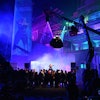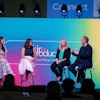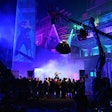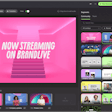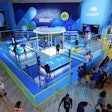
ATLANTA—It would be easy for a film festival to take a straightforward approach to going virtual—after all, the attendees are there primarily to watch the films, right? But Kenny Blank, the executive director of last month’s Atlanta Jewish Film Festival, had more ambitious goals.
“We spent a lot of time debating how to reimagine this festival. Do we just shut down? Do we skip a year? Do we go all virtual?" he remembered. "The charge that we heard from our community was that we should rise to this challenge, and have some really unique components that still created that sense of an event, created that sense of community connection.”
Blank said the team spent several months studying what other arts organizations were doing, and trying to learn from their experiences. The result was a 12-day gathering, held Feb. 17-28, that drew more than 39,000 attendees and screened 38 feature films and 16 short films including several world premieres. The festival took a hybrid approach, featuring a mix of virtual Q&As, drive-in screenings, VIP mailers, a broadcast-quality award show and interactive conversations.
Here are six key lessons that any event can learn from the festival's success.
1. Engage your community with year-round programming.
When the 20th anniversary of the festival wrapped up in February 2020, the team had no idea it would be one of the last large community gatherings of the year. When it was clear live events were on pause, Blank and his team quickly decided to organize a series of webinars and podcasts to keep the community engaged. “We knew right away there was an opportunity here to provide audiences entertainment, to provide them escape, to provide them connection through cultural programming during those critical early months of the pandemic when everyone was truly sequestered at home,” he explained. “We pivoted very quickly to figure out ways to embrace the virtual format.”
The Atlanta Jewish Film Festival has long had a particular focus on fostering dialogue between audiences of different faiths and backgrounds, and Blank says the goal was always to continue those conversations. “We knew audiences were going to be consuming a lot of movies on their own at home through third-party streaming platforms, but one of the strengths of our festival and many other festivals has always been the dialogue that happens around the movies, and the chance to interact with film artists, creators, actors and directors,” he said.
That desire to foster dialogue also led to an expanded program of virtual Q&As during the festival itself. “With virtual, it afforded us the opportunity to bring in many more guest speakers with a national or international pedigree, who we might not have been able to in the past,” Blank noted. Another bonus? Many of the filmmakers and speakers could record personal introductions for the film screenings. “We had never had that level of participation from all the filmmakers in our lineup. Every filmmaker participated via a personalized introduction, and then for roughly half the lineup we had facilitated Q&As with major actors and directors and professional moderators.”
2. Let people access content when it’s convenient for them.
For the film screenings, dubbed the “virtual cinema” and powered by CineSend, attendees were given a flexible 48-hour window to watch. The screenings were accessible on smart TVs, computers, tablets and even mobile phones. That same flexibility applied to the Q&A conversations, which were watchable any time in the virtual cinema; they’re also now available for free, year-round, on the festival’s website and YouTube page.
Blank said that the flexibility actually made audiences more likely to tune into post-screening Q&As. “In a typical festival, those might be 15- or 20-minute conversations after the film screening, and oftentimes audiences wouldn’t stay,” he noted. “But by utilizing the virtual platform, we were able to make these really compelling standalone programs in their own right. … And now audiences can access them at any time, after they've had some time to sit with the film.”
 The “Festival-in-a-Box” was mailed to 1,100 attendees.Photo: Courtesy of Atlanta Jewish Film Festival
The “Festival-in-a-Box” was mailed to 1,100 attendees.Photo: Courtesy of Atlanta Jewish Film Festival
While Blank and his team leaned heavily into the virtual components, it was also important to them to have some in-person elements. One way was through the "Festival-in-a-Box," a mailer sent to 1,100 VIPs on the first day of the event.
“It was a way to create a physical touchpoint with the audience, to let them know we're thinking about them and taking care of them,” explained Blank. The boxes featured popcorn, candy, a branded mug and pair of socks, and other goodies, along with a custom recipe book featuring dishes and discounts from local Atlanta restaurants. For the opening- and closing-night events, attendees could also purchase a gourmet dinner from Added Touch Catering, available for delivery or pick-up.
The team also hosted a number of drive-in experiences at Atlanta's Mercedes-Benz Stadium. The goal, said Blank, was to create that communal movie-going experience. “We’ve seen a certain nostalgia for the drive-in during the pandemic. We looked at that and said, ‘How can we take that experience and really raise the bar?’” he said, adding that the Home Depot Backyard, an 11-acre tailgating space outside the NFL stadium, was the right fit for what he was looking for.
“Through our partnership with the venue, we created a really deluxe premium drive-in experience with a 70-foot screen and food trucks and all the bells and whistles. Around that time of year, people were anxious to get out and do something safe as a community, so it allowed us to still bring our audience together.” The drive-in, which held 200 vehicles for three nights of screenings, also allowed the team to provide family-friendly entertainment, bringing in a demographic the festival may not have otherwise served.  The drive-in screenings took over the Home Depot Backyard, the stadium’s 11-acre tailgating space. They hosted 200 vehicles for three nights of screenings.Photo: Courtesy of Atlanta Jewish Film Festival
The drive-in screenings took over the Home Depot Backyard, the stadium’s 11-acre tailgating space. They hosted 200 vehicles for three nights of screenings.Photo: Courtesy of Atlanta Jewish Film Festival
4. Interaction and engagement are crucial.
For an extra level of engagement, the festival included a virtual lobby where attendees could connect with one another for lunchtime conversations via Zoom. “We knew that audiences wanted to see each other, and this is a very much a community film festival; it's very much about seeing your friends and neighbors and family members, who would typically come together in the theater and then talk about the films afterwards,” Blank noted. “So the Virtual Lobby filled that need for face time.”
The virtual space, which drew about 600 attendees, did feature some formal Q&As with talent from the films, but was mostly utilized for informal conversations—almost like a book club, Blank explained. “Our festival is known for some edgier films, films that provoke a lot of conversation and dialogue and movies you are going to want to spend some time talking about. So it was the right fit.”
 The festival’s opening- and closing-night galas, as well as its award show, took a more broadcast-inspired approach. Hosts and presenters were filmed on stage, while winners accepted the awards from home.Photo: Ari Isenberg
The festival’s opening- and closing-night galas, as well as its award show, took a more broadcast-inspired approach. Hosts and presenters were filmed on stage, while winners accepted the awards from home.Photo: Ari Isenberg
The team also reimagined its award show, opening- and closing-night galas, and preshow entertainment for a virtual environment. “We found ourselves getting into the film and video production business ourselves to recreate these events,” laughed Blank. "So it was really quite an ambitious undertaking.”
To help, the team partnered with a number of local video production companies, and utilized the local performing arts venue that is typically home to the festival. Hosts and musical entertainment were filmed on the stage and broadcast virtually, and filmmakers recorded their acceptance speeches from their own homes. “We were able to get all of this content prerecorded and post-produced in a highly polished, refined way, and then present that in our virtual cinema,” Blank said. “So it was a way to again recreate that sense of a special event, but do it in a virtual format.”
6. Recognize that the industry has changed—and be ready to change with it.
While Blank is eager to return to large live events, he does think that future editions of the festival will keep some of the components established this year. “The team worked so incredibly hard. Many times during the process, we'd think to ourselves, ‘We're going to be spending all this energy problem-solving for this year—are we ever going to be able to use our learnings in the future? The answer is absolutely yes.”
He continued, “We know that the entertainment and film-festival industry is going to look very different coming out of this, that the traditional theatrical-going experience is going to permanently change.” Blank noted that the response from the audience was overwhelmingly positive. “We're very much open to taking what we learned from this year, holding onto some of the best of these innovations and carrying them forward. And hopefully at some point, marrying those with the traditional festival-going experience from the past.”
